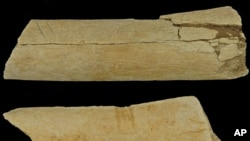Scientists have discovered evidence that human ancestors were using stone tools and consuming meat nearly a million years earlier than previously thought. Researchers say the finding shifts the known time frame of landmark behaviors by early humans.
The stone tools were found by scientists with the California Academy of Sciences-funded Dikika Project. The team has been excavating at the same site in Ethiopia where the oldest human remains, Australopithecus afarensis, were discovered. The team has been excavating at the same site in Ethiopia where the oldest human remains, Australopithecus afarensis, were discovered.
Those human finds included the fossilized remains of the tiny female hominid named "Lucy" and the child dubbed "Selam."
Scientists put the age of the fossilized tools - the rib of a cow-sized animal and the thigh bone of a goat-sized antelope - at 3.4 million years. Until now, the oldest known stone tools, also found in Ethiopia, were estimated to be 2.4 million years old.
Shannon McPherron discovered the bones 200 meters away from where archaeologists unearthed Selam in 2000.
McPherron, an archaeologist at the Max Planck Institute for Evolutionary Biology in Germany, says he instantly knew something was different about these new fossils.
"The first one was the rib fragment," said Shannon McPherron. "And [I] picked it up and flipped it over and saw the two grooves that are in there and right away thought 'this is different. This looks like what I know to be stone tool modifications on bones. ' We looked around some more and then we found the femur fragment as well with more marks on it."
McPherron says the grooves were produced when the bones were used as butchering tools to strip meat from animal carcasses or break open other animal bones to get at the marrow.
McPherron says there is no evidence that the tools were used for hunting.
McPherron says the discovery of the tools is important because it suggests that an evolutionary landmark - the consumption of meat by early humans - occurred an estimated 800,000 years earlier than previously thought.
"We really think that meat consumption is one of the more important factors that led to the development of our species," she said. "Meat has a higher nutritional intake [content] that allows, for instance, growing a larger brain."
McPherron says researchers are now trying to piece together factors that led prehistoric humans to begin consuming meat at an earlier point in their evolution:
"What we may have shown is that there was actually a long period - a million years or so - where the diet had expanded to include meat, but meat hadn't really become the emphasis that it would become later," said McPherron. "So, it sort of changes the dynamic. Now we need to look at what would have changed that, what would have made meat such an important ingredient in the diet."
Stone Tools Discovery Suggests Earlier Meat-Eating by Human Ancestors




